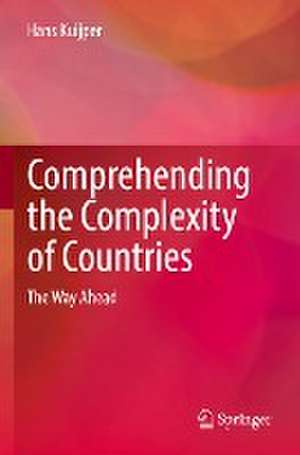Comprehending the Complexity of Countries: The Way Ahead
Autor Hans Kuijperen Limba Engleză Paperback – 20 ian 2023
| Toate formatele și edițiile | Preț | Express |
|---|---|---|
| Paperback (1) | 646.62 lei 6-8 săpt. | |
| Springer Nature Singapore – 20 ian 2023 | 646.62 lei 6-8 săpt. | |
| Hardback (1) | 653.00 lei 6-8 săpt. | |
| Springer Nature Singapore – 19 ian 2022 | 653.00 lei 6-8 săpt. |
Preț: 646.62 lei
Preț vechi: 760.73 lei
-15% Nou
Puncte Express: 970
Preț estimativ în valută:
123.73€ • 134.82$ • 104.26£
123.73€ • 134.82$ • 104.26£
Carte tipărită la comandă
Livrare economică 23 aprilie-07 mai
Preluare comenzi: 021 569.72.76
Specificații
ISBN-13: 9789811647116
ISBN-10: 9811647119
Pagini: 394
Ilustrații: XXVI, 394 p. 4 illus.
Dimensiuni: 155 x 235 mm
Greutate: 0.59 kg
Ediția:1st ed. 2022
Editura: Springer Nature Singapore
Colecția Springer
Locul publicării:Singapore, Singapore
ISBN-10: 9811647119
Pagini: 394
Ilustrații: XXVI, 394 p. 4 illus.
Dimensiuni: 155 x 235 mm
Greutate: 0.59 kg
Ediția:1st ed. 2022
Editura: Springer Nature Singapore
Colecția Springer
Locul publicării:Singapore, Singapore
Cuprins
Introduction.- 1 The enduring confusion.- 2 Theories and models.- 3 The concept of country.- 4 Cities and countries.- 5 Scientific feasibility of collaborative country studies.- 6 Countries consist of both spontaneous and man-made systems.- 7 Technical feasibility of collaborative country studies.- 8 Implications of higher education: Connect the dots!.- 9 Reductionism or Holism?.- 10 General Conclusions.- Summary and Suggestion.
Notă biografică
Hans Kuijper has a Master’s in Sinology (Hànxué) from Leiden University and in economics from Erasmus University Rotterdam. After three years working at the Netherlands Organization for Scientific Research, he joined the Ministry of Economic Affairs, in The Hague, where he became responsible for doing research and reporting on the political, social and economic developments in East Asian countries. Seconded to the Ministry of Foreign Affairs, he was appointed as Commercial Attaché at the Netherlands Embassy in Singapore, where – besides other pre-occupations – he was involved in the forming of a Dutch consortium that would tender to dig the tunnel for, and perform the construction of, the Metro (MRT). In 1986, he became Trade Representative of The Netherlands in Taiwan, where he learned about the details, and became aware of the complexity, of the so-called Taiwan–China Problem. Retired from Civil Service in 2000, he resumed studying philosophy of the social sciences, becoming increasingly interested in the science of (complex) systems and computer science. He has written a number of critical articles on the academic study of regions and countries.
Textul de pe ultima copertă
This book argues for computer-aided collaborative country research based on the science of complex and dynamic systems. It provides an in-depth discussion of systems and computer science, concluding that proper understanding of a country is only possible if a genuinely interdisciplinary and truly international approach is taken; one that is based on complexity science and supported by computer science. Country studies should be carefully designed and collaboratively carried out, and a new generation of country students should pay more attention to the fast growing potential of digitized and electronically connected libraries. In this frenzied age of globalization, foreign policy makers may – to the benefit of a better world – profit from the radically new country studies pleaded for in the book. Its author emphasizes that reductionism and holism are not antagonistic but complementary, arguing that parts are always parts of a whole and a whole has always parts.
Caracteristici
Compares the difference between area/country studies conducted in Europe and the United States Identifies the fundamental problem with area/country studies and its relevance Explores both the scientific and technical feasibility of interdisciplinary and international country studies
